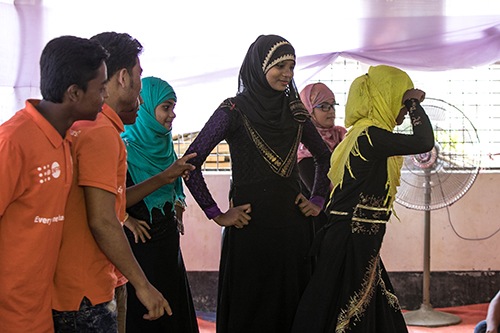Updates
Support from Korea to strengthen gender-based violence services for Rohingya refugees in Bangladesh
25 Sep 2018
Updates
25 Sep 2018
New funding from the Republic of Korea will boost UNFPA’s efforts to prevent and respond to gender-based violence experienced by Rohingya refugees in Bangladesh, with a focus on community outreach and engagement.
The $1 million commitment, signed on 14 August 2018, will support UNFPA’s continued humanitarian response to the extraordinary influx of refugees into the Cox’s Bazar district. About 80 per cent of the refugees – numbering 919,000 as of August – are women and children.
UNFPA’s response has targeted the needs of women and girls, and now also adolescent boys. Insufficient access to basic health and protection services, limited mobility and few livelihood opportunities have given rise to heightened risks of trafficking, exploitation, child marriage, and sexual and gender-based violence, including harassment and intimate partner violence. Adolescents are especially vulnerable.
Efforts to ensure access to protection and sexual and reproductive health services – and to encourage women and girls to use them – have come up against a range of challenges, including social norms that stigmatize survivors of violence, reluctance to seek care, and severe natural disasters that have damaged facilities.
The new funding from Korea will especially strengthen community-based protection mechanisms, which have played a critical role in connecting Rohingya refugee women and girls to the information and services they need.
Over the course of one year, the project will establish five women-friendly spaces serving refugee and host communities in Cox’s Bazar.
“Women Friendly Spaces are sometimes the only places where women can go for psychosocial support, help with accessing services, or simply to get some privacy or talk to their friends,” said Asa Torkelsson, UNFPA Representative in Bangladesh.

UNFPA has already established 19 such spaces, known as shanti khana or ‘houses of peace’ – but demand for safe spaces for women and youth continues to grow. “The demand is there for more Women Friendly Spaces,” noted Dr. Torkelsson. “With this assistance from the Korean Government we will be able to give more women the chance to get the help they need, to heal, to access information, and to just be themselves.”
Additionally, 10 women-led community centres will be built in refugee communities, where women and girls – especially survivors of violence – will have the chance to learn life skills and livelihoods. These additional centres, said Dr. Torkelsson, “will enable us to provide more skills training, so that women have more options for the future.”
Capacity building for case management and health staff will improve the quality of services available in the area. Meanwhile, distribution of dignity kits will provide women and girls with essential clothing, hygiene items and informational materials – all of which encourage women and girls to seek care when they need it, and reduce stigmatization associated with menstruation or poor hygiene.
The dignity kits will be pre-positioned during the monsoon and cyclone seasons, so that when natural disasters strike, the supplies can quickly reach women and girls who need them.
Through local NGO partners, UNFPA will also mobilize community members to address violence against women and girls – including through outreach to encourage youth and community leaders to challenge traditional norms, and by engaging men and boys to support gender equality.
Finally, implementation of a gender-based violence information management system will provide reliable, ethically collected data. This is key to identifying and closing gaps in service access, designing programming that better serves survivors’ needs, and improving coordination, advocacy and fundraising efforts.
The range of activities made possible by this new commitment for Korea, said Dr. Torkelsson, will broaden the reach of UNFPA's services to women and girls in refugee and host communities in Cox’s Bazar, and continue to improve their quality.